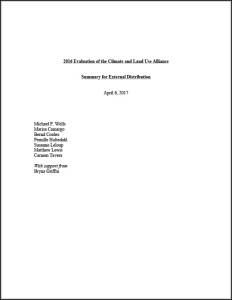The challenge
Roughly one quarter of the man-made greenhouse gases that are warming our planet come from agriculture and changes in land use, including clearing forests to make way for soy and palm oil plantations and for cattle ranching. The world’s forests are being destroyed at an unconscionable rate: 18.7 million acres of forests per year, or 27 soccer fields every minute, according to the World Wildlife Fund. In addition to driving climate change, this forest loss threatens biodiversity as well as the lives and livelihoods of indigenous and rural communities. Despite growing attention to the links between community rights, climate change and forests, those who defend their lands from deforestation face violence, criminalization, expulsion, and even murder.
What we did
In 2010, Ford and three other foundations — ClimateWorks, Gordon and Betty Moore, and David and Lucile Packard — formed the Climate and Land Use Alliance (CLUA) as a way to coordinate grantmaking activities and promote sustainable land use as an essential part of the global response to climate change. CLUA has focused on supporting viable solutions to conserve and restore forests and slow the loss of key ecosystems while at the same time protecting the livelihoods and land rights of poor rural and indigenous communities.
To inform strategy updates in 2017, this high-level evaluation looked at CLUA’s activities between 2013-2016 and assessed the achievements of:
- Its geographic initiatives in Brazil, Indonesia, Mexico and Central America, and at the global level;
- Its thematic strategies focused on communications, community land rights, commodities (palm oil, soy and beef), and bioenergy;
- External engagement by CLUA staff and team members in international forest affairs.
As CLUA has a unique structure, the evaluation also considered how this helped or hindered it in pursuing its aims. Though CLUA has its own staff, its program teams include program officers from the partner foundations who are responsible for grantmaking; additionally, though CLUA’s board and executive director approve grants, the foundations do not pool their funds. During the period under review, CLUA made 586 grants totaling $169 million.
What we learned
- CLUA has made advances in key areas: drawing attention to the connections between land use and climate change, promoting the role of indigenous peoples, and securing policy gains. CLUA has made a significant contribution to media coverage of forest and land use issues globally, especially in international media and on issues related to indigenous land rights and the role of forests in mitigating climate change. In Mexico and Central America, the Alliance strengthened grantees’ capacities for national advocacy, ensuring better consultation and involvement of groups representing indigenous peoples, resulting in tangible impacts on REDD+ processes and community rights. In Indonesia, CLUA’s grantees helped convince some of the world’s largest pulp and paper and palm oil companies to agree to zero-deforestation commitments, and CLUA-funded analyses contributed to progressive government policies, including a five-year moratorium on new palm oil licenses.
Progress across CLUA’s geographic areas has been mixed, due to varying levels of coordination among Alliance members as well as context-specific challenges. CLUA has skillfully achieved genuine synergies between Alliance members at the global level, but to a lesser degree within the regional geographic initiatives. There is a need for improved and more deliberate collaboration between the Alliance partners, particularly in Brazil and Indonesia where the portfolios appear relatively broad and scattered. Strategies were also hampered by challenges like the political chaos in Brazil.
- CLUA’s work on commodity supply chains and bioenergy shows promise, however, more internal collaboration is needed. The evaluation recommends that the Alliance look across its work on palm oil, soy and beef to strengthen learning and to reinforce its work on commodity supply chain transparency, making the business case for sustainability, and the diverse stakeholder engagement that CLUA excels at. CLUA’s bioenergy strategy has played an important role in promoting a sustainable approach to bioenergy in the EU; advocacy and research activities funded through CLUA have influenced significant policy advances in both the EU and the US. This work could be strengthened through cooperation across CLUA on bioenergy (currently the domain of one Alliance member), and by harmonizing strategies on bioenergy and palm oil.
The benefits of membership in CLUA outweigh the costs. While CLUA demands considerable time and energy from the participating staff of the Alliance members, there is a strong sense of value being added. The evaluation found that CLUA is well led and staffed, has developed effective management and internal reporting systems, and is performing at a high level. Given CLUA’s strengths, the evaluation’s authors urge the Alliance to consider what could be achieved with substantially greater investment and a higher risk approach.
